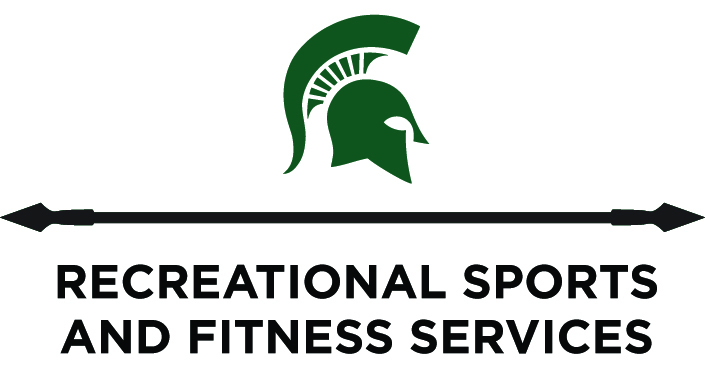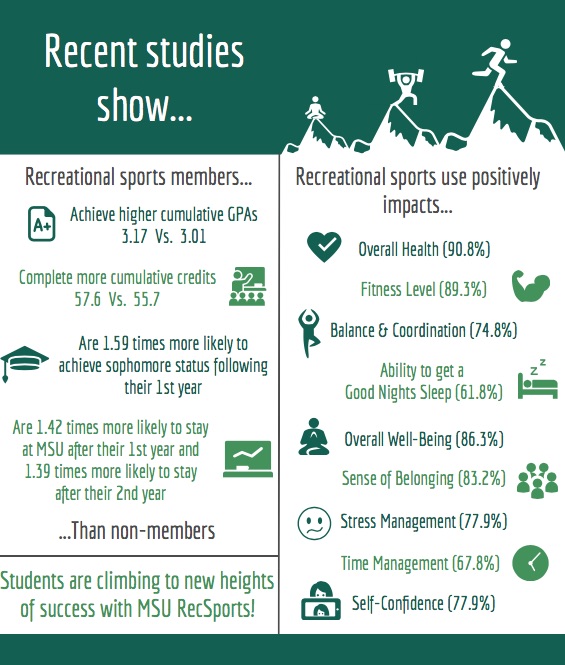About

Our Mission:
To promote each participant's learning experience by engaging the university community in healthy lifestyles through sport, fitness, and recreational opportunities.
-
Program Overview
The programs offered by the Department are facilitated through three indoor intramural facilities, one multi-purpose arena, 27 acres of outdoor recreational field space, an off-site sailing center and shared campus facilities including tennis courts, golf courses, and an ice arena among others. The program specific functions include informal or drop-in recreation at any of these facilities; structured competitive intramural sports; programs dedicated for health, wellness and fitness; sport club opportunities; non-credit instruction for acquiring new skills; and unique opportunities targeted for persons with disabilities. The staff responsible for administering these programs include ten administrative, four support and approximately 450 student employees. We serve our University students, faculty-staff, retirees and alumni, with limited opportunities for the general public.
-
Learning Outcomes
Recreational Sports and Fitness Services will be cast as the destination for students, faculty and staff to participate in a wide variety of activities that includes intramural and club sports, aquatics, non-credit instruction, drop in recreation, adaptive and fitness opportunities. In addition, we will be seen as a primary service provider for the University's desire to create a more health conscious and fitness oriented campus, and as a collaborative partner of fitness within the residence hall structure. Through participation in these broad based programs and opportunities, our students and employees will benefit from the following outcomes listed below:
LEARNING OUTCOMES
The Department has identified the following Learning Outcomes as relevant to the programs and activities that are offered, especially targeted to the university students:
Competitive Intramural Sports
- Frequency of healthy behaviors
- Ability to manage composure and behavior
- Ability to function as a member of a team
- Improved knowledge and experience of diversity
- Improved level of personal fitness
Informal or Drop-in Recreation
- Balancing academic and life skills
- Self-discipline, respect and esteem
- Habits of healthy behaviors
- Satisfying and productive lifestyle
- Reward of work ethic
Health, Wellness and Fitness
- Improved personal fitness level
- Results of healthy behavior choices
- Self-discipline and confidence
- Flexibility and strength of muscles
- Kinesthetic balance and agility
Club Sports
- Time management skills
- School pride and sense of belonging
- Overall leadership development
- Understanding of and importance of finances
- Quality of in-depth personal relationships
- Develop interpersonal relationships
- Learn how to be part of a team
Non-credit Instruction
- Development and appraisal of new skills
- Willingness to accept new challenges
- Improved self-confidence
- Rewards of work ethic
- Willingness and need to collaborate
Programming for Persons with disabilities
- Maximizing ability
- Self-confidence
- Improved personal fitness
- Sport opportunity adaptation
- Willingness to accept challenges
Student Employment
- Developing relationships with management
- Ability to realistically appraise skills
- Leadership and delegation skills
- Ability to receive and provide constructive criticism
- Stress and time management skills
-
Student Success
Self-Reported Wellness Benefits of Recreational Sports Use in College Freshmen
Kerri L. Vasold1, Samantha J. Deere2, James M. Pivarnik1
1Michigan State University, East Lansing, Michigan; 2Saginaw Valley State University,
University Center, Michigan
Previous research has shown a positive relationship between academic success and recreational sports participation. Few studies have investigated the relationships between recreational sports participation and psychosocial/physical health indicators.PURPOSE: To investigate the impact of recreational sports on psychosocial and physical health indicators in college freshmen, and determine differences in impact between high and low users.
METHODS: Participants included freshmen students who participated in an online survey and consented to recreational sports usage tracking. Usage was collected via ID card swipe each time the student utilized the University fitness centers, group fitness classes, and participated in intramural sports games. Users were categorized as high or low (median split) based on total usage during their 1st year. The survey was administered during the 2nd semester of participants’ 1st year. Participants reported the impact (1=very negatively to 5=very positively) of their usage on psychosocial and physical health variables. Responses were categorized into negative/no impact (1-3) and positive impact (4,5). Frequencies were calculated for variables of interest. Logistic regression was utilized to investigate the impact of recreational sports use on psychosocial and physical health variables.
RESULTS: The sample (N=131) was 51.1 percent male and primarily Caucasian (82.4%). On average, high users had 48.1±39.2 ID card swipes per year; low users had 6.1±3.3. Most participants reported that recreational sports participation had a positive impact on psychosocial and physical health: overall well-being (86.3%); sense of belonging (83.2%); stress management (77.9%); selfconfidence (77.9%); time management (68.7%); overall health (90.8%); fitness level (89.3%); weight control (64.9%); balance and coordination (74.8%); and sleep (61.8%). High users were more likely than low users to report positive impacts on overall wellbeing (OR: 3.2; 95%CI: 1.1-9.5), fitness level (OR: 4.4; 95%CI: 1.2-16.7), and selfconfidence (OR: 3.0; 95%CI: 1.2-7.1).
CONCLUSION: Recreational sports participation had a positive impact on self-reported psychosocial and physical health in college freshmen, and frequency of participation played a role in some of these relationships.


